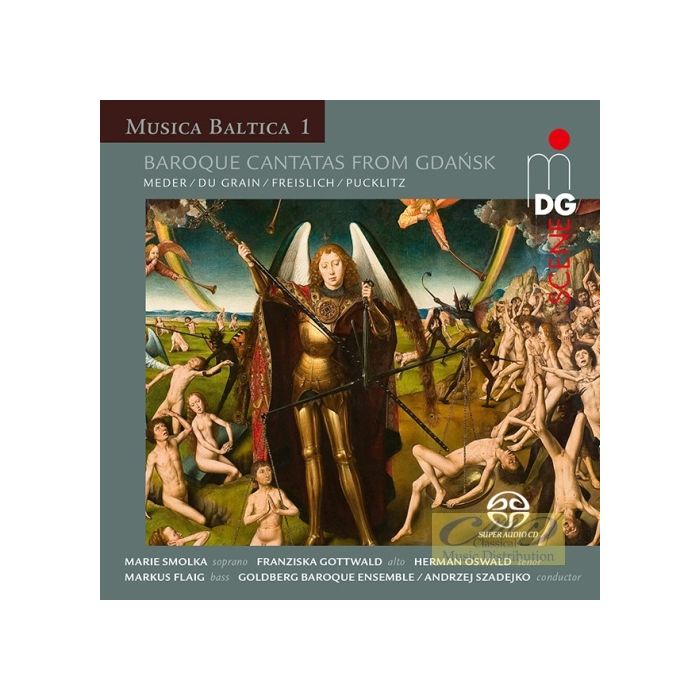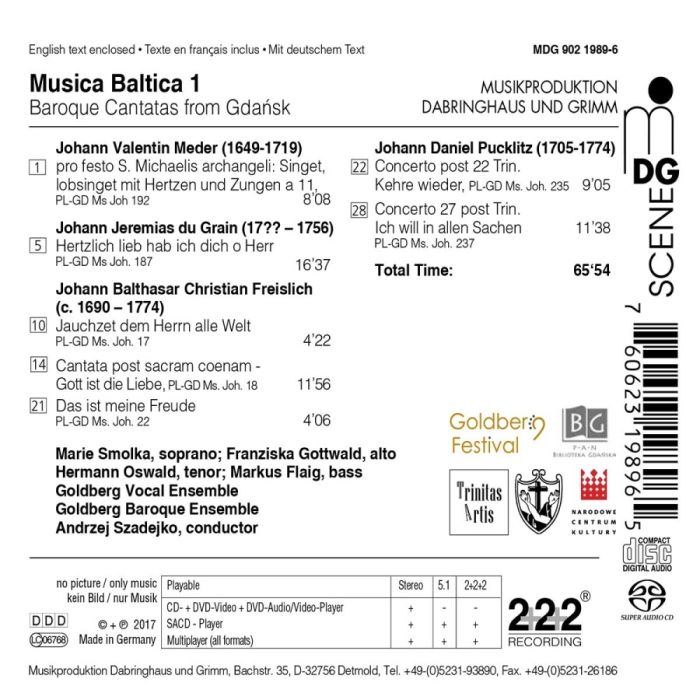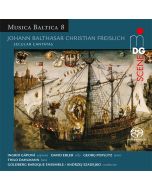
(Produkt nie został jeszcze oceniony)
kompozytor
różni kompozytorzy
tytuł
Baroque Cantatas from Gdańsk - Musica Baltica Vol. 1
pełny spis kompozytorów
Freislich, Johann Balthasar Christian, Grain, Johann Jeremias du, Meder, Johann Valentin, Pucklitz, Johann Daniel, różni kompozytorzy
wykonawcy
Goldberg Baroque Ensemble, Szadejko, Andrzej
nr katalogowy
MDG 902 1989-6
opis
When Gdansk, then German-speaking and protestant Danzig, under the reign of the Polish king, was an independent and prosperous center of trade and commerce, it also enjoyed the status of a magnificent and multifaceted music center. However, many of the sources documenting its rich cultural heritage are no longer extant, most of them destroyed by war. Andrzej Szadejko has researched the historic holdings of the Gdansk Library of Polish Academy of the Sciences and made surprising discoveries. On this world-premiere recording he leads the Goldberg Baroque Ensemble in performances of seven Baroque cantatas in every way equaling the originality and mastery of works by much more famous composers of those times.
The names of the composers - Meder, Pucklitz, Freislich, and du Grain - surely will be known to only a few music experts Johann Balthasar Christian Freislich's cantata "Gott ist die Liebe" demonstrates that he is a match for even the greatest Baroque masters. The fine art of the aria "Gott gleichet einem grossen Meere" puts the soloists to the ultimate test, and teh style and melodic sumptuousness of "Wer in der Liebe Gottes bleibet" might have been born of an opera by Handel. Johann Daniel Pucklitz displays a personal signature and originality. The tenor aria "Lass mich Jesu dir entgegen" forms an absolute high point on this album. Even the accompaniment with the obbligato bassoon and basso continuo makes us sit up and listen, and when at teh end of his life the singerrepresenting humankind surrenders his spirit to his Creator in a peaceful idyll, the chorus joins in to the sound of the trumpet and with "Ende gut, alles gut" - thereby producing a magnificent sound impression.
• Freislich: Cantata post sacrum coenam - Gott ist die Liebe
• Freislich: Das ist meine Freude
• Freislich: Jauchzet dem Herrn alle Welt
• Grain: Hertzlich lieb hab ich dich o Herr
• Meder: Singet, lobsinget mit Herzen und Zungen
• Pucklitz: Ich will in allen Sachen
• Pucklitz: Kehre wieder
The names of the composers - Meder, Pucklitz, Freislich, and du Grain - surely will be known to only a few music experts Johann Balthasar Christian Freislich's cantata "Gott ist die Liebe" demonstrates that he is a match for even the greatest Baroque masters. The fine art of the aria "Gott gleichet einem grossen Meere" puts the soloists to the ultimate test, and teh style and melodic sumptuousness of "Wer in der Liebe Gottes bleibet" might have been born of an opera by Handel. Johann Daniel Pucklitz displays a personal signature and originality. The tenor aria "Lass mich Jesu dir entgegen" forms an absolute high point on this album. Even the accompaniment with the obbligato bassoon and basso continuo makes us sit up and listen, and when at teh end of his life the singerrepresenting humankind surrenders his spirit to his Creator in a peaceful idyll, the chorus joins in to the sound of the trumpet and with "Ende gut, alles gut" - thereby producing a magnificent sound impression.
Works:
• Freislich: Cantata post sacrum coenam - Gott ist die Liebe
• Freislich: Das ist meine Freude
• Freislich: Jauchzet dem Herrn alle Welt
• Grain: Hertzlich lieb hab ich dich o Herr
• Meder: Singet, lobsinget mit Herzen und Zungen
• Pucklitz: Ich will in allen Sachen
• Pucklitz: Kehre wieder
nośnik
SACD
data wydania
23.01.2017
EAN / kod kreskowy
760623198965
75,00 zł
Produkt dostępny.
Wysyłka w ciągu 3 dni roboczych
Darmowa wysyłka dla zamówień powyżej 300 zł!
Darmowy kurier dla zamówień powyżej 500 zł!
sprawdź koszty wysyłkiProduktu jeszcze nie zrecenzowano, chcesz być pierwszy?
Pozostałe płyty tego wykonawcy
1 / 1

